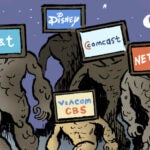Consolidation has opened up better measurement solutions in podcasting – and big brands are jumping in.
On Wednesday, Omnicom said it will invest $20 million upfront into podcasts on Spotify in the second half of 2020, The Wall Street Journal first reported. The deal also gives Omnicom access to exclusive and original content globally and the opportunity to develop branded podcasts for clients.
While it’s not unprecedented for advertisers to buy podcasts upfront, it’s the first deal of its kind for Spotify, which has grown its presence in the space majorly since 2019. Early that year Spotify acquired Gimlet and Anchor, followed by Parcast in March. It then bought Bill Simmons’ The Ringer in early 2020, and in May, it inked an exclusive, multiyear licensing deal with podcast juggernaut Joe Rogan.
But it’s not just content that attracted Omnicom to the deal. At CES in January, Spotify launched the ability for brands to dynamically insert ads into podcast streams on original and exclusive shows and measure whether a listener actually heard the ad. That moves podcasting away from the faulty download metric and gives brands a better understanding of ROI – at least within Spotify’s walls.
“The growth in audio in the last couple of years has been impressive,” said Catherine Sullivan, chief investment officer in North America for Omnicom Media Group. “Between content, technology and consumer growth, the ability to make it addressable will be exciting.”
Omnicom previously bought podcasts as particular shows, or to reach an audience through dynamic ad insertion. The agency plans to spend more on podcasts as listening grows, content becomes more accessible and consumption moves to streaming, making listenership and ROI to easier to measure.
“When you represent clients like State Farm, Diageo, AT&T, McDonald’s, and PepsiCo, they’re expecting to be the leaders in their category,” Sullivan said. “But being a first-mover without [proving] value is meaningless.”
Spotify was a natural place to invest upfront because the platform is leading in both content and technology, Sullivan said. Spotify, which has more than 1 million shows on its platform, declined to break out what percentage of podcasts are streamed vs. downloaded, or how many advertisers are using its streaming ad insertion product.
Spotify did, however, recently surpass Apple, which has dominated the space for years, as the No. 1 podcast listening app across major markets, according to MIDiA research group. Spotify has shown an appetite to invest heavily in improving the podcast experience for both advertisers and consumers, while Apple has notoriously shared little data with publishers and brands.
The Spotify deal also aligns with Omnicom’s investment strategy, which is focused on creating direct deals and private marketplaces with premium publishers. But more deals like this could push more dollars behind closed platforms, creating yet another media marketplace with powerful walled gardens.
For now, Omnicom is “dipping its toes in the water” with podcasts and will consider doing similar deals with other providers down the road, Sullivan said. But none of the other players have quite the mix of content and technology as Spotify to warrant an upfront investment yet.
“For us, technology without content is meaningless,” Sullivan said. “The combination of the two will accelerate [Spotify’s] ability to get global attention and scale.”















